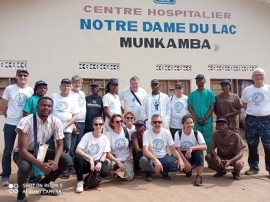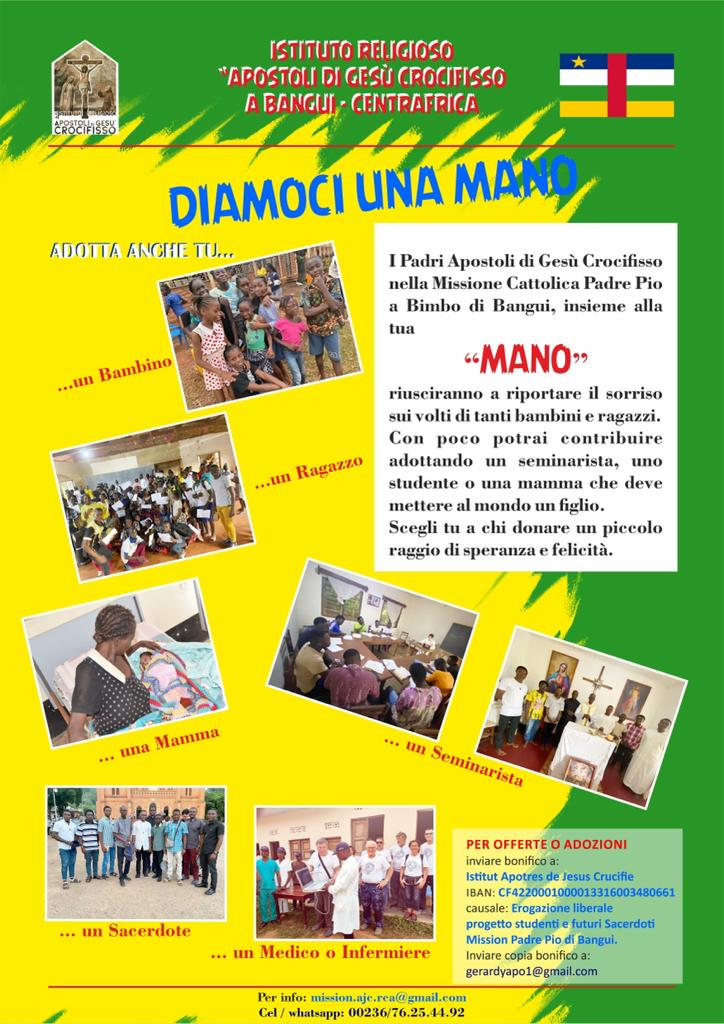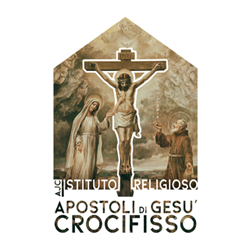 Scritto da Rodelio I. Mapula | Categoria: A proposito di noi | Pubblicato il 08/03/2024
Scritto da Rodelio I. Mapula | Categoria: A proposito di noi | Pubblicato il 08/03/2024
“For just as each of us has one body with many members, and these members do not all have the same function, so in Christ we, though many, form one body, and each member belongs to all the others.” (Romans 12:4-5)
The concept of community originates from God's very nature, which is the communion of the Father, the Son, and the Holy Spirit, the three divine persons of the Blessed Trinity. For this, man is called to join this universal fraternity by developing a close relationship with himself and by engaging in interpersonal communion (Fraternal Life in Community, 9). To live in communion with Jesus, to share his life and destiny, and to be a symbol of the life and communion he started, the religious community becomes an expression of this ecclesial communion (FLC, 10). In order to be able to recognize the signs of the times and adapt to new ways of living out this one single communion, the Apostles of Jesus Crucified of Davao Community in the Philippines strive to be raised and enlightened by the Word of God.
Multiculturalism presents challenges and at the same time, strengthens communities. Religious life is not exempted in this reality since a community can be an international community where different persons from different countries will congregate to live under one roof. Three ethnicities/nationalities currently make up the Davao community: Filipino, Timorese, and Sri Lankan. These questions of culture and their manifestations in a way concerns human relationships at some point. Cultural practices, language, personal values, etc. may differ. As a result, these differences may cause misunderstandings and conflicts; however, this diverse presence within the religious community is always seen positively and with hope for continued vitality. Do cultural differences prevent us from realizing what St. Paul says in his letter to the Romans 12:4-5? That should not stop us from entering this divine communion. Above all these cultures should always be the Christ-culture. That is, the common denominator that binds all these differences.
When we have a genuine understanding of what Christian community is, we can transcend our understanding of community life into fraternal communion – from something visible to something spiritual. How do we respond to that reality of diverseness? Cultural and personal differences should be celebrated and viewed as opportunities to grow and learn new approaches to different situations, rather than being solely blamed for misunderstandings and conflict. Fostering relationships with members of other cultures is essential to creating diverse communities with the strength to accomplish important objectives. Furthermore, to effectively coexist with members of diverse cultures, we need to establish strong, compassionate bonds based on mutual respect, understanding, and common objectives. Despite our differences, we are united by our desire to create a genuine Christian community. Pope Francis said that “united” doesn’t mean identical. Unity isn’t uniformity. He implored that we must understand the richness of our differences. It is in these differences that dialogue takes place. It’s from these differences that one learns from the other, as brothers.
As a multicultural religious institute, we exercise to cultivate this community life, first, and foremost, through nourishing our spirituality and community prayer as its primary component. Above all, it is a divine communion communicated to each member of the community. Without this “glue”, each member might fall into the danger of individualism. Our community prayer, which is based on contemplating God in this divine communion, is the foundation and source of our community life. The communal life of the religious institute is also based on the sharing of lectio divina, introspection on God's word, and testimonies of individual faith. This mutual understanding fosters mutual respect and trust as well as aids in community reconciliation.
Being creative and showing initiative when working to develop the community in all of its facets has been emphasized as a community rule. Every member is taught to contribute what they can do best. Each member is assigned tasks and a shared responsibility in order to help them all become familiar with the workings of religious life. In the context of the religious institute's charism, spirituality, and mission, each member is called to contribute to strengthening the Church's unity and carrying out the mission that Christ gave to it. To do this, we fulfill the various tasks or responsibilities that are appropriate for each member. Sharing meals together is another way that the religious community tries, to promote this communal life. Everyone benefits from having a sense of belonging and maintaining relationships during shared mealtimes. It encourages listening, which enables each member to share their joys and pains. Given that some members are preoccupied with their own responsibilities, table talk provides a forum for everyone to voice their thoughts.
The religious community allocates time for leisure. Movie watching, every Thursday night, encourages community, and fosters camaraderie. It strengthens the member’s emotional ties. This can assist in removing any obstacles between members of the community. It serves also as a good time to laugh. After the movie, we share and discuss the memorable moments. The religious community also schedules sports time. In interacting with one another, each member is able to develop a stronger, healthier, and happier self. In addition to sports' many physical, psychological, and cognitive advantages, the community values sports more for their social component, which fosters interpersonal relationships and provides chances for social interaction.
These are the outward manifestations but we also need to remember the spiritual aspect, which is full-spectrum fraternal communion – communion of life (cf. Can. 602). Community life as Jean Vanier (philosopher and theologian) would say is a place of feast and forgiveness. There is pain but more of joy. Since the ideal community can only be found in heaven, there can never be a perfect community. Difficulties and obstacles typical of communal life may arise during the course of journeying together. In order to clearly demonstrate this belonging to Christ, who calls and chooses brothers and sisters to live together in his name, every religious should be committed to feeling co-responsible for fraternal life in common (FLC, 71). Above all these things, the Holy Eucharist must be the center of this communion. This is the starting point of all growth in fraternity (cf. Can. 608). For this, we are called and for this, we are to live.






